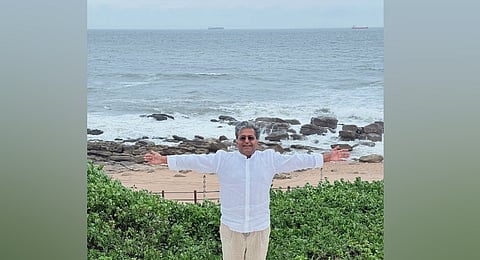

Vanuatu, a small island nation in the South Pacific Ocean, on Monday announced its decision to cancel citizenship for Indian businessman and fugitive Lalit Modi. Shortly after the Indian media was flooded with the news, Modi posted pictures of him relishing on the island, with the caption that read: "Vanuatu a beautiful country. You must put it on your bucket list. Away from all the pollution and noise. Truly heavenly country."
Island nations in the Oceania are indeed in the bucket lists of the ultra rich for several reasons beyond its turquoise water, white beaches, coral reefs and lush greenery.
These island nations are the safest places for the world's ultra rich to dump their assets effectively evading taxes at home. Besides, it is also the perfect haven for criminals to settle down after fleeing their homeland. Island nations like the Cook Islands are by policy facilitating tax evasions for the world's billionaires, protecting them from any legal trouble at home.
However, Vanuatu, with its decision to turn its back on billionaire Lalit Modi is disrupting this pattern. Why is this island country taking the bold decision, at a time when countries like the US are opening their doors to billionaires unconditionally?
'Heavenly Country'
Vanuatu, quirky as its name, is an interesting Y-shaped archipelago of 83 islands located in the South Pacific Ocean between Fiji and Australia. The island's name, which means something similar to "to stand for home" symbolises its independence after European colonisation.
Besides its attractive geography and rich cultural heritage, Vanuatu is also known for its affordable 'Citizenship by Investment' (CBI) program which requires the individual to pay $1,30,000 to become a Vanuatuan.
Like other island countries, over the years, Vanuatu's citizenship laws have been reportedly abused by rich individuals fleeing legal procedures in their homelands.
Last December, in a first, the European Union revoked a visa-free travel agreement with Vanuatu, noting that its citizenship program could pose a security threat to the 27-nation bloc.
"The EU is revoking the visa exemption, which had already been suspended since 2022, because Vanuatu runs an investor citizenship scheme which has resulted in security and migration risks for the EU... These risks include the infiltration of organised crime, money-laundering, tax evasion and corruption,” the EU said.
In the statement ordering cancellation of Modi's citizenship on Monday, Vanuatu's Prime Minister Jotham Napat remarked that the Vanuatuan passport is a privilege and attempt to escape extradition cannot be a legitimate reason to apply for it.
Acknowledging that Lalit Modi is facing allegations that are yet to be proven in court, Napat stressed that "he will not be facing them as a Vanuatu citizen."
"We have seen an increasing number of citizens through our investment program choosing to make Vanuatu their home due to ongoing turmoil in various parts of the world, and we welcome them wholeheartedly. However... we will not harbour fugitives or criminals. We have zero tolerance for those seeking to use our citizenship program to evade justice. If that is your intention, I strongly advise you to look elsewhere,” Napat said.
The PM also explained the country's efforts over the years to curtail such citizenships.
"The Government of Vanuatu has significantly strengthened the due diligence aspect of its Citizenship by Investment Programme over the past four years, resulting in a marked increase in applications failing the enhanced scrutiny undertaken by the Vanuatu Financial Intelligence Unit. The improved process implemented several years ago includes triple-agency checks, including Interpol verification,” the statement read.
Before Lalit Modi, Vanuatu had also rejected diamond jeweller and Indian fugitive Nirav Modi’s citizenship application.
According to an Indian Express report, Nirav Modi's citizenship application was rejected by Vanuatu government after "a Government Financial Intelligence Unit (FIU) probity check found adverse findings against him."
Vanuatu's improved filtering of its citizenship comes amid US President Donald Trump's introduction of the "gold card" visa which would pave way for American citizenship at a hefty investment of $5 million.
"They'll be wealthy and they'll be successful, and they'll be spending a lot of money and paying a lot of taxes and employing a lot of people, and we think it's going to be extremely successful," Trump had said introducing the citizenship program.
Cutting the path for unconditional citizenship, Trump's gold card visa is feared to open up the doors of America to criminals and fugitives who can afford the large sum.
In a 2023 report, global money laundering watchdog Financial Action Task Force (FATF) emphasised that the citizenship by investment program of several countries have been increasingly misused by criminals and the corrupt.
“Granting citizenship and residency to wealthy investors through 'golden' passport and visa programmes can potentially lead to economic growth. But they can and are being exploited by criminals and the corrupt, who want to launder their money hide their identity and assets, or carry out further crimes," FATF President T. Raja Kumar said.
Highlighting how such citizenship programs can allow criminals more global mobility and help them hide their identity and criminal activities behind shell companies in other jurisdictions, FATF called on the governments to implement a variety of safeguards to ensure these programmes are administered in a risk-sensitive way.